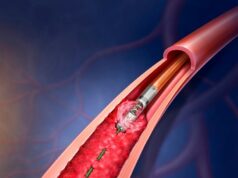 The All Party Parliamentary Group on Vascular Disease has released its latest report on patient access to technologies for the diagnosis and treatment of peripheral arterial disease.
The All Party Parliamentary Group on Vascular Disease has released its latest report on patient access to technologies for the diagnosis and treatment of peripheral arterial disease.
Access to technology facilitates the earlier and more accurate identification of people at potential risk of amputation, heart attack, stroke and early death from arterial disease, the report claims. It also facilitates improvements in the treatment and outcomes of patients who require intervention. Despite this, there is still a wide variation within vascular services across the country, which perpetuates the health postcode lottery.
The report reveals a number of barriers to effective diagnosis and management of peripheral arterial disease. Sixty-nine per cent of respondents to the Group’s inquiry do not believe that every patient who requires intervention is assessed by an appropriate foot/vascular multidisciplinary team who can then refer on correctly. Further challenges revealed by the report include problems with recruiting the adequate number of appropriate clinicians—such as sonographers to carry out imaging—and lack of education of the primary care workforce in identifying the symptoms of peripheral arterial disease.
 With an ever-increasing focus on accelerating access to innovative technology, the Group wanted to focus on this issue. Just 25% of respondents to the inquiry felt that all patients who could benefit from drug-eluting technologies have access to it. The issue of drug-eluting technologies is currently being reviewed by NICE. According to a press release, the Group believes that NICE guidance should reflect standard practice and should ensure that all patients have access to the most appropriate technology no matter where they live in the country.
With an ever-increasing focus on accelerating access to innovative technology, the Group wanted to focus on this issue. Just 25% of respondents to the inquiry felt that all patients who could benefit from drug-eluting technologies have access to it. The issue of drug-eluting technologies is currently being reviewed by NICE. According to a press release, the Group believes that NICE guidance should reflect standard practice and should ensure that all patients have access to the most appropriate technology no matter where they live in the country.
This report was produced following an inquiry held by the Group, which invited written and oral evidence from a variety of stakeholders. The aim of the inquiry was to identify good practice and produce a set of recommendations which can be adopted to standardise care received by patients. The findings have been consolidated within a final report, which provides guidance and recommendations for those responsible for the design, commissioning and delivery of vascular services.
Over 11,500 major lower limb amputations are carried out every year, the vast majority of which are as a direct result of peripheral arterial disease, diabetes or a combination of the two. Statistics released by Diabetes UK reveal that 20 diabetes-related amputations are performed in England every day.

Neil Carmichael, chair of the All Party Parliamentary Group on Vascular Disease, stated that “with the diabetes epidemic on the rise and set to continue, rates of amputation and other diabetes-related complications will also increase, with a spiralling cost to the NHS. This trend must be reversed”.













